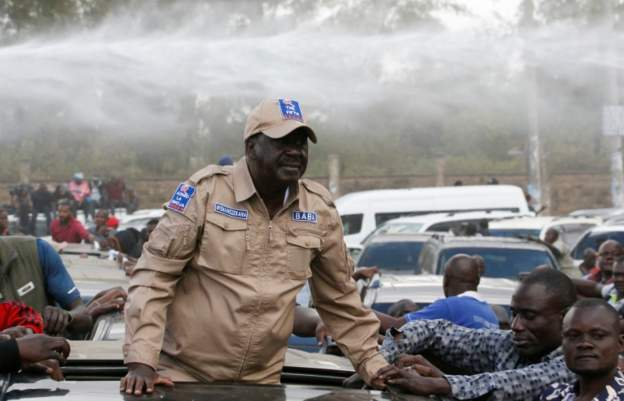Kenya’s Opposition Leader Halts Anti-Government Demonstrations After President Ruto Calls for Talks
Violent protest in Nairobi, Kenya on Monday. Photo: John Muchucha/REUTERS.
Raila Odinga, the Kenyan opposition leader, agreed to meet for negotiation talks with President William Ruto after weeks of violent protests challenging the 2022 presidential election outcome. The protesters, alleging fraud in the election and opposing the high living costs in Kenya, have amassed three times since March 20th, looting businesses, clashing with police and setting buildings and cars on fire. Five people were killed and 400 wounded.
In August of 2022, Ruto was called winner of the Kenyan presidential election after receiving 50.5% of the nation’s votes. Odinga claimed that the tally was tampered with in forty-one polling locations in order to push Ruto’s votes over the 50% mark.
After votes are tallied at each polling location in Kenya, the results were submitted electronically to the national voting center and published online. Odinga’s lawyers declared that forty-one polling locations changed the votes on the uploaded forms online before being published by the electoral commission.
After the Kenyan Supreme Court upheld the outcome of the election, Odinga called for his supporters to take to the streets in protest. The protests turned violent with looting, clashes with the police, burning of businesses and places of worship. Odinga riled up the protestors with anti-government sentiment, and the rise in the cost of living that Odinga said he would address if in office.
Odinga called for another demonstration on Monday, but called it off when president Ruto called for a halt to the protests and offered to negotiate. Ruto wanted to discuss the electoral commission and how the institution tallied the winners. Odinga agreed to halt demonstrations and talk with Ruto, but threatened his supporters would resume protests if the government did not resolve the issue.
Raila Odinga participating in a protest in Nairobi, Kenya where police are using water hoses to control the riots. Photo: Thomas Mukoya/REUTERS.
Odinga called out the police for firing tear-gas and water hoses at protesters, stating that, “It’s a violation of a fundamental right to demonstrate.” Odinga called for April 3rd to be the “Mega Monday,” when his supporters would assume control of the government, but called it off saying he would meet with Ruto to discuss concerns over the electoral process.
Kenya’s inflation grew 9.2% last year according to the Kenya National Bureau of Statistics, driving up food prices and transportation, causing widespread resentment towards the current government. Odinga has riled up the protesters on this issue, saying “the high cost of living is not something that can be left to wait. Kenyans have suffered seriously, and we are saying subsidies should be reinstated now.”
The protests in Kenya have sparked unease in the region as a nation that is usually a beacon of stable democracy and anti-corruption. The African Union and the United States, among other countries, have advocated for dialogue between the two parties. The 2007 presidential elections in Kenya that left more than 1,200 people killed, is an omnipresent fear during this time of elevated election violence.
The tentative violence depends on the success of the bipartisan talks between Ruto and Odinga projected to happen this week. Ruto has asserted he will not compromise, stating, “That way the system of checks and balances remains intact.”


